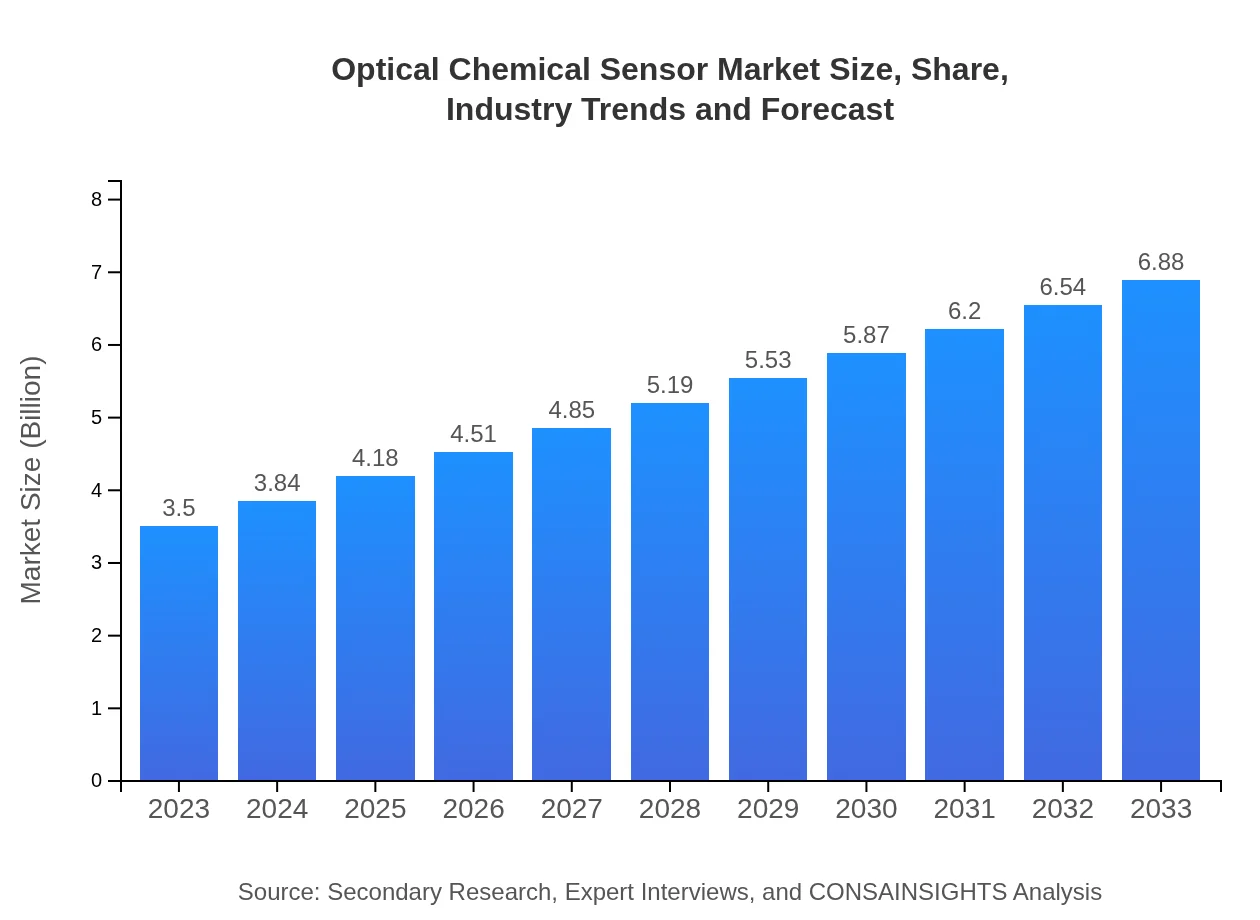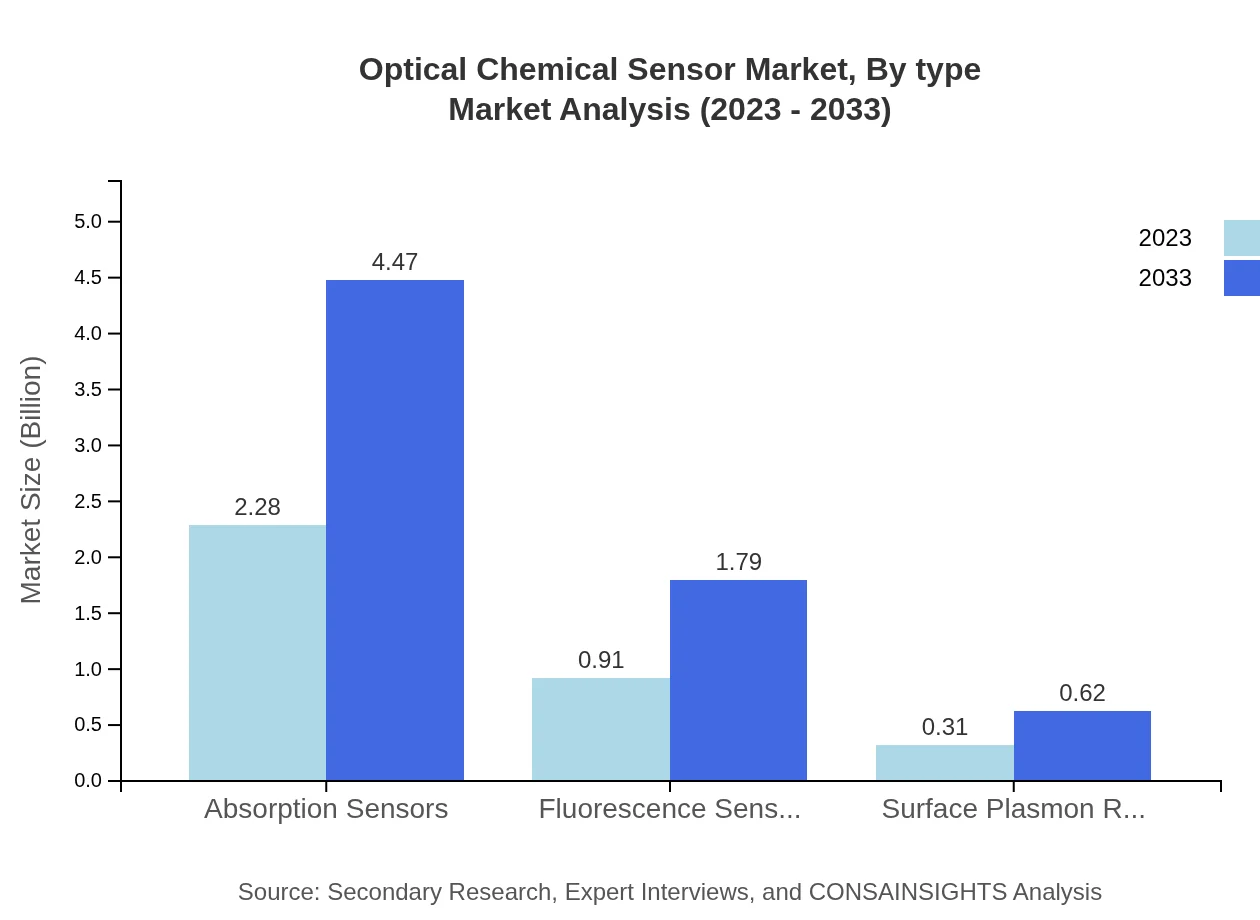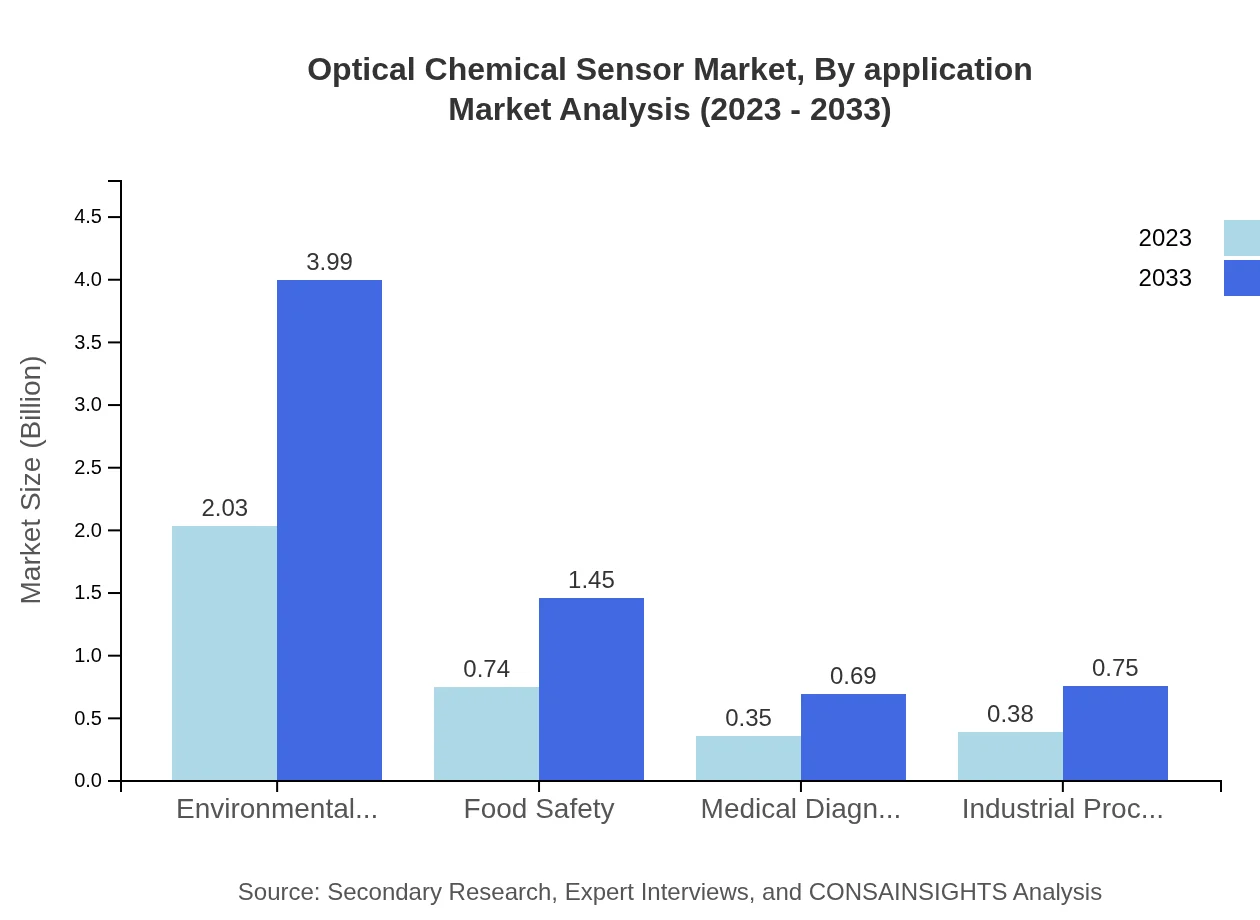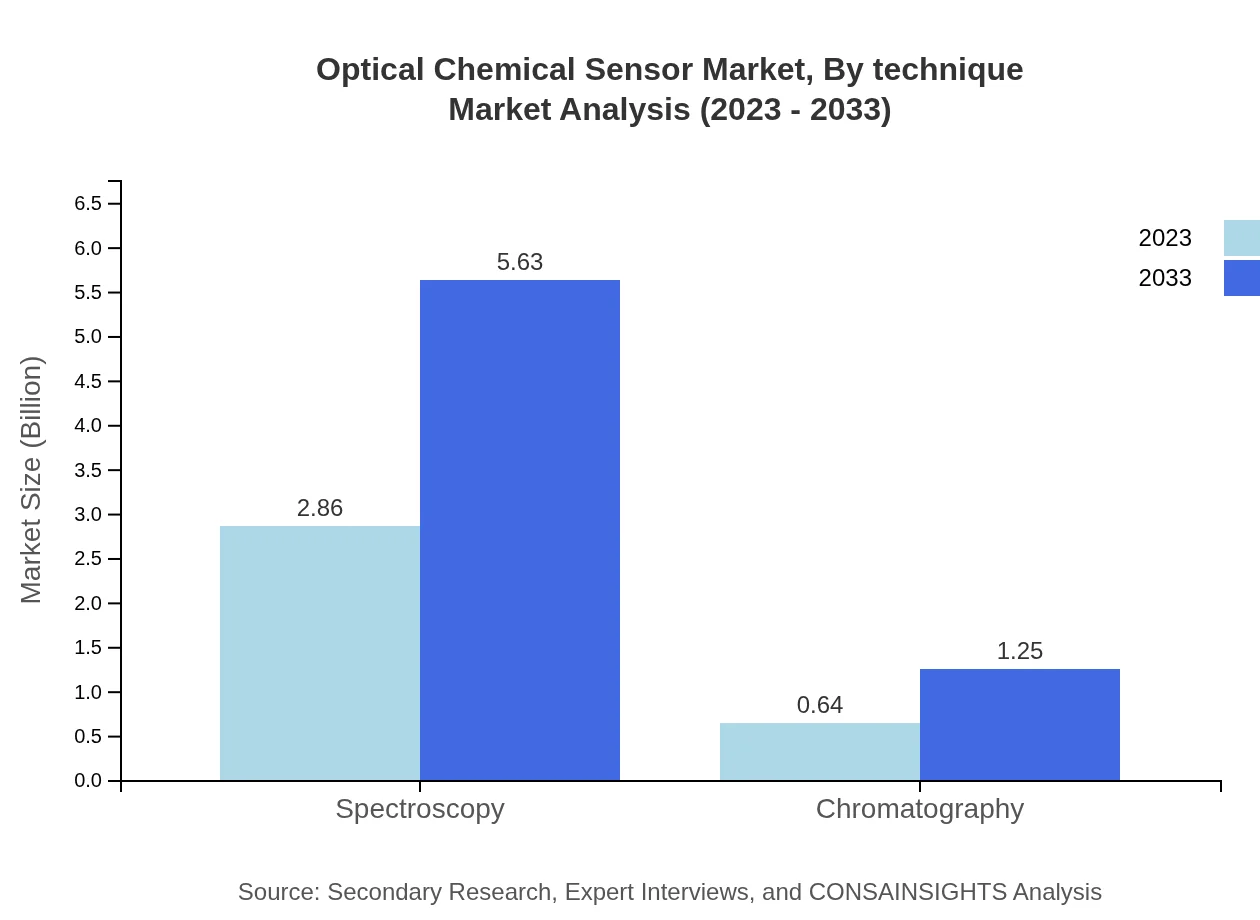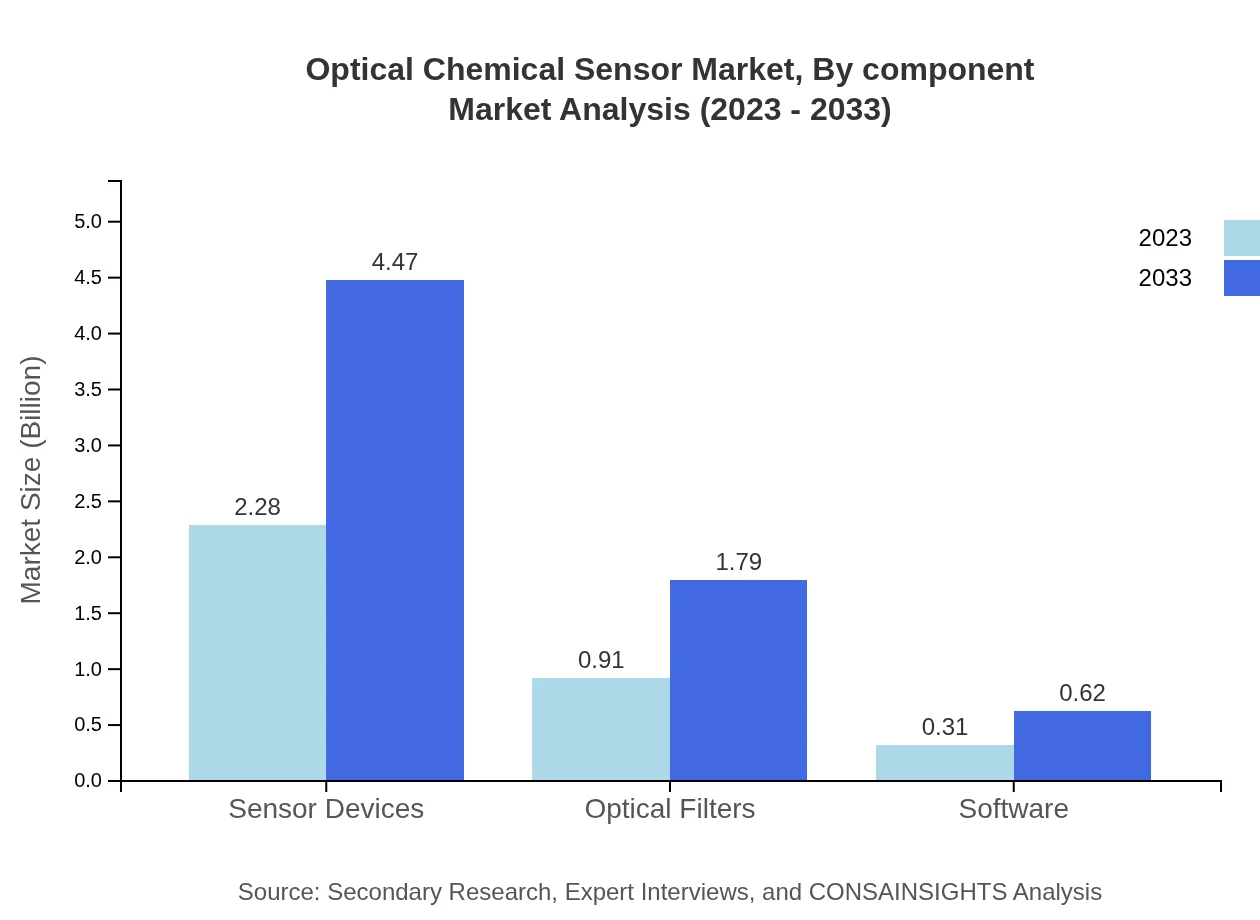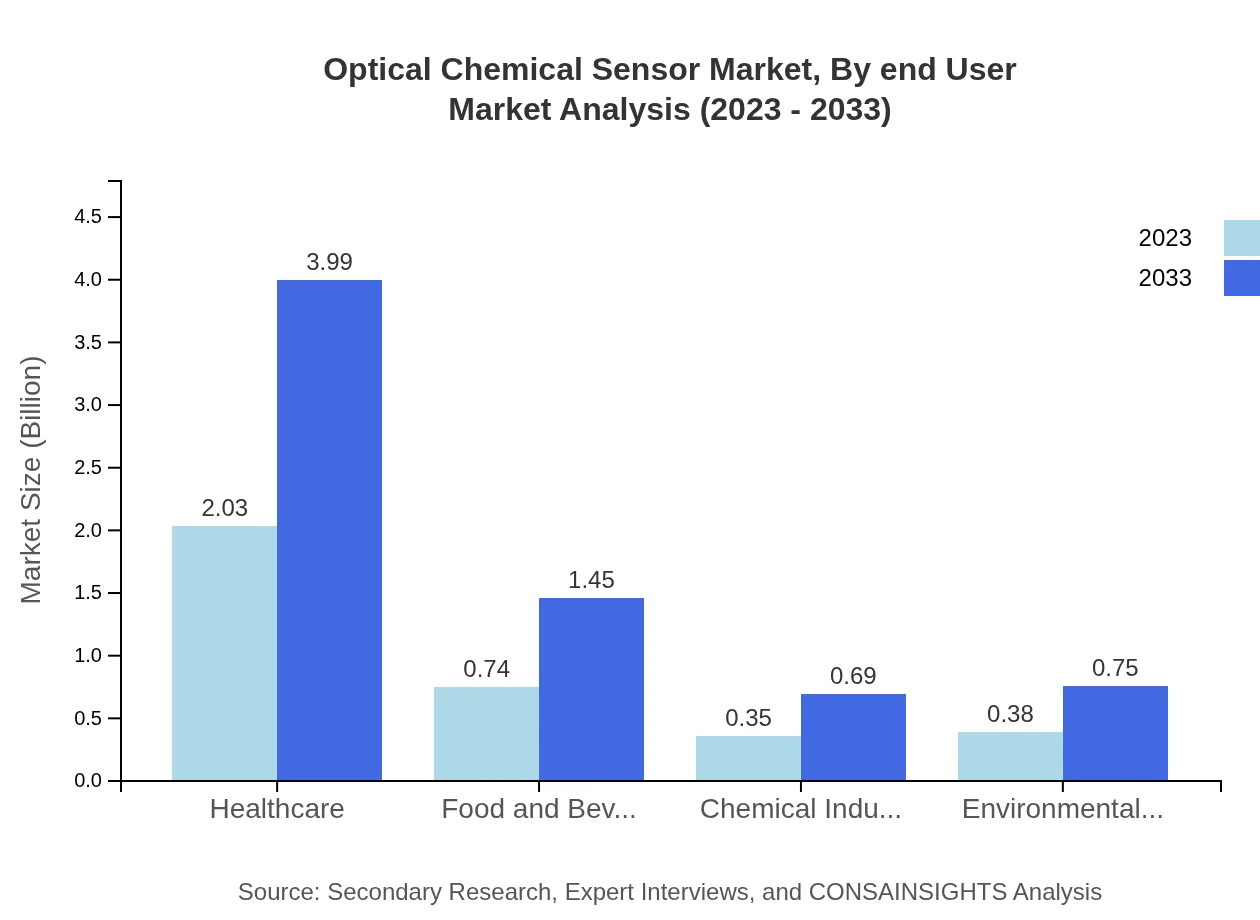Optical Chemical Sensor Market Report
Published Date: 31 January 2026 | Report Code: optical-chemical-sensor
Optical Chemical Sensor Market Size, Share, Industry Trends and Forecast to 2033
This report provides a comprehensive analysis of the Optical Chemical Sensor market, including key insights, market dynamics, and growth projections for the period 2023 to 2033.
| Metric | Value |
|---|---|
| Study Period | 2023 - 2033 |
| 2023 Market Size | $3.50 Billion |
| CAGR (2023-2033) | 6.8% |
| 2033 Market Size | $6.88 Billion |
| Top Companies | Honeywell International Inc., Siemens AG, Emerson Electric Co., Teledyne Technologies Incorporated |
| Last Modified Date | 31 January 2026 |
Optical Chemical Sensor Market Overview
Customize Optical Chemical Sensor Market Report market research report
- ✔ Get in-depth analysis of Optical Chemical Sensor market size, growth, and forecasts.
- ✔ Understand Optical Chemical Sensor's regional dynamics and industry-specific trends.
- ✔ Identify potential applications, end-user demand, and growth segments in Optical Chemical Sensor
What is the Market Size & CAGR of Optical Chemical Sensor market in 2023?
Optical Chemical Sensor Industry Analysis
Optical Chemical Sensor Market Segmentation and Scope
Tell us your focus area and get a customized research report.
Optical Chemical Sensor Market Analysis Report by Region
Europe Optical Chemical Sensor Market Report:
The European market will expand from $1.22 billion in 2023 to approximately $2.39 billion in 2033, driven by advancements in healthcare technology and an increasing focus on sustainable practices across industries.Asia Pacific Optical Chemical Sensor Market Report:
The Asia Pacific region is projected to experience robust growth, with the market expected to grow from $630 million in 2023 to approximately $1.25 billion by 2033. This growth is driven by increasing industrialization, heightened healthcare investments, and the rise of environmental monitoring initiatives.North America Optical Chemical Sensor Market Report:
North America is expected to lead the market, growing from $1.15 billion in 2023 to $2.26 billion by 2033. This growth can be attributed to strong investment in research and development, as well as stringent regulatory frameworks that promote high-tech sensor applications.South America Optical Chemical Sensor Market Report:
In South America, the market for Optical Chemical Sensors is anticipated to grow from $40 million in 2023 to around $70 million in 2033. The growth will primarily be fueled by increased agricultural activities and government initiatives aimed at improving environmental quality.Middle East & Africa Optical Chemical Sensor Market Report:
The market in the Middle East and Africa is anticipated to grow from $460 million to $900 million during the same period, fueled by increased investments in infrastructure and environmental monitoring systems.Tell us your focus area and get a customized research report.
Optical Chemical Sensor Market Analysis By Type
The market for absorption sensors is valued at $2.28 billion in 2023, projected to reach $4.47 billion by 2033. Fluorescence sensors follow, starting from $910 million in 2023 and growing to $1.79 billion. Surface plasmon resonance sensors currently occupy a market size of $310 million, expected to grow to $620 million in the coming decade.
Optical Chemical Sensor Market Analysis By Application
In healthcare, the market size is estimated at $2.03 billion in 2023, with a projected increase to $3.99 billion by 2033. The food and beverage sector demonstrates similar growth, moving from $740 million to $1.45 billion. The environmental monitoring application is expected to maintain a significant market share, starting at $2.03 billion and increasing to $3.99 billion in the forecast period.
Optical Chemical Sensor Market Analysis By Technique
Spectroscopy holds the largest market share within the Optical Chemical Sensor space, valued at $2.86 billion in 2023 with an anticipated growth to $5.63 billion by 2033. Chromatography also plays a crucial role, starting at $640 million and predicted to reach $1.25 billion.
Optical Chemical Sensor Market Analysis By Component
The major component of Optical Chemical Sensors, sensor devices, represents 65% of the market share, valued at approximately $2.28 billion in 2023 and forecasted to rise to $4.47 billion by 2033. Optical filters and software also represent significant market segments with notable growth expected in the coming years.
Optical Chemical Sensor Market Analysis By End User
Key end-users of Optical Chemical Sensors include the healthcare sector, environmental agencies, and the chemical industry. The healthcare segment constitutes 58% of the total market share, followed by the food safety sector at 21.07%. Environmental agencies hold a noteworthy share as well, indicating the importance of monitoring and compliance within industrial processes.
Optical Chemical Sensor Market Trends and Future Forecast
Tell us your focus area and get a customized research report.
Global Market Leaders and Top Companies in Optical Chemical Sensor Industry
Honeywell International Inc.:
A leading player in the sensor technology space, Honeywell focuses on developing innovative chemical sensors and solutions for industrial applications.Siemens AG:
Utilizing cutting-edge technologies, Siemens develops high-performance optical sensors known for their reliability in various sectors including healthcare and environmental monitoring.Emerson Electric Co.:
Emerson specializes in advanced sensing technology with a strong emphasis on optical sensors for industrial process automation.Teledyne Technologies Incorporated:
Teledyne provides sophisticated sensor technologies targeted towards the environmental, industrial, and healthcare sectors, enhancing data accuracy and application efficiency.We're grateful to work with incredible clients.









FAQs
What is the market size of optical Chemical Sensor?
The global optical-chemical sensor market is valued at approximately $3.5 billion in 2023, with a projected CAGR of 6.8% through to 2033. This growth reflects increasing demand across various sectors, particularly healthcare and environmental monitoring.
What are the key market players or companies in this optical Chemical Sensor industry?
Key players in the optical-chemical sensor market include companies specializing in sensor technology, such as Sensirion AG, ABB Ltd, and Honeywell International. Their innovations and partnerships drive competitive dynamics, enhancing market growth and technological advancements.
What are the primary factors driving the growth in the optical Chemical Sensor industry?
Factors fueling growth in the optical-chemical sensor market include rising demand for accurate monitoring in healthcare, environmental protection regulations, and advancements in sensor technologies, which improve performance and reduce costs.
Which region is the fastest Growing in the optical Chemical Sensor?
Asia Pacific is projected to be the fastest-growing region in the optical-chemical sensor market, with growth from $0.63 billion in 2023 to $1.25 billion by 2033, driven by industrial expansion and increasing investment in healthcare technologies.
Does ConsaInsights provide customized market report data for the optical Chemical Sensor industry?
Yes, ConsaInsights offers customized market report data tailored to the optical-chemical sensor industry. Clients can request specific insights, data segments, and regional analyses to suit their unique business requirements.
What deliverables can I expect from this optical Chemical Sensor market research project?
Deliverables from the optical-chemical sensor market research project include detailed market analysis reports, segment breakdowns, growth forecasts, competitive landscape assessments, and insights on regional trends and opportunities.
What are the market trends of optical Chemical Sensor?
Current trends in the optical-chemical sensor market include increased adoption of absorption sensors, integration with digital technologies, and a growing focus on environmental monitoring, particularly in healthcare and industrial processes.

